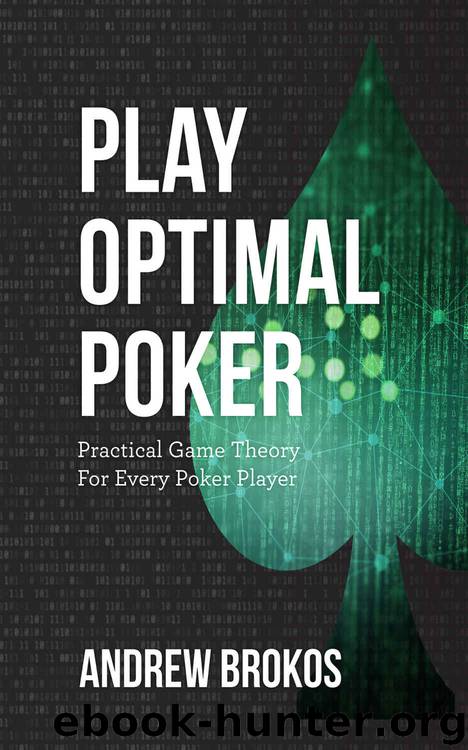Play Optimal Poker: Practical Game Theory for Every Poker Player by Andrew Brokos

Author:Andrew Brokos [Brokos, Andrew]
Language: eng
Format: epub
Published: 2019-06-03T22:00:00+00:00
Envision the Equilibrium
Ask yourself, “How would this hand play out if my opponent and I were replaced by game theoretically optimal supercomputers?” You aren’t a game theoretically optimal supercomputer, so you won’t be able to answer this precisely, but you should consider factors like:
Which player should be more inclined to bet?
What kind of range should each player bet?
Which are the best hands for each player to value bet?
If I bet, what should my opponent’s raising range look like?
What are the weakest hands with which my opponent ought to commit his entire stack?
Once you have a sense of what your opponent’s equilibrium strategy ought to look like, it will be easier to envision how he is likely to deviate from it. Then, you can think about how to take advantage of those deviations.
I often use the term "mistake" to mean any deviation from equilibrium. In truth, there are many good reasons why a player might deliberately deviate from equilibrium, especially if he underestimates your understanding of poker. So, these may not be “mistakes” in that they might be the best plays given the incomplete information that he has about you. However, if you adapt correctly, you can ensure that they are indeed mistakes that will cost him EV.
If you’re new to game theory, this will probably be the hardest step in the entire process. The good news is that it’s not an all-or-nothing proposition: even if you get only the rough contours correct (“I should mostly check, and my opponent should mostly bet”) that’s still a big step up from not thinking about the equilibrium at all. With practice, experience, and study, you’ll get better and better at envisioning equilibria.
Make a Read
Ask yourself, "How is my opponent deviating from his equilibrium strategy?" Be explicit about this, and as specific as you can. "He's calling too often with pure bluff-catchers on the river," is much more useful than "He's too loose," or "He's a fish."
It's OK if all you have are hunches. It's rare to have a surefire read, just as it's rare to have a surefire winning hand. Poker is fundamentally a game about making decisions under conditions of uncertainty. Later in the process, we'll account for how confident you are in your read.
If you're playing online, you can use the “Notes” feature offered by virtually all sites to record your reads and then change and refine them as you gain more information over time. This also enables you to keep track of reads across sessions, so that if you encounter a player again, you can remind yourself how he played. Just bear in mind that people change over time, both because they make deliberate changes to their play and because of nebulous factors like mood. Old reads are better than nothing, but they aren't as good as fresh reads.
If you're playing live, I still recommend writing down reads. You can use a pen and a paper or an app on one of those tiny computers that you probably carry with you.
Download
This site does not store any files on its server. We only index and link to content provided by other sites. Please contact the content providers to delete copyright contents if any and email us, we'll remove relevant links or contents immediately.
The Infinite Retina by Robert Scoble Irena Cronin(5252)
Harry Potter and the Cursed Child: The Journey by Harry Potter Theatrical Productions(4292)
The Sports Rules Book by Human Kinetics(4045)
Molly's Game: From Hollywood's Elite to Wall Street's Billionaire Boys Club, My High-Stakes Adventure in the World of Underground Poker by Molly Bloom(3315)
A Knight of the Seven Kingdoms by George R R Martin(3005)
Quidditch Through the Ages by J.K. Rowling(2973)
How To by Randall Munroe(2895)
Quidditch Through the Ages by J K Rowling & Kennilworthy Whisp(2864)
Quidditch Through the Ages by Kennilworthy Whisp by J.K. Rowling(2737)
Flowers For Algernon by Daniel Keyes(2709)
Quidditch through the Ages by J. K. Rowling(2685)
Stacked Decks by The Rotenberg Collection(2662)
Quidditch Through The Ages by J. K. Rowling(2652)
776 Stupidest Things Ever Said by Ross Petras(2566)
What If?: Serious Scientific Answers to Absurd Hypothetical Questions by Randall Munroe(2527)
Ready Player One: A Novel by Ernest Cline(2524)
Beautiful Oblivion by Jamie McGuire(2443)
The Book of Questions: Revised and Updated by Gregory Stock Ph.d(2424)
Champions of Illusion by Susana Martinez-Conde & Stephen Macknik(2304)
